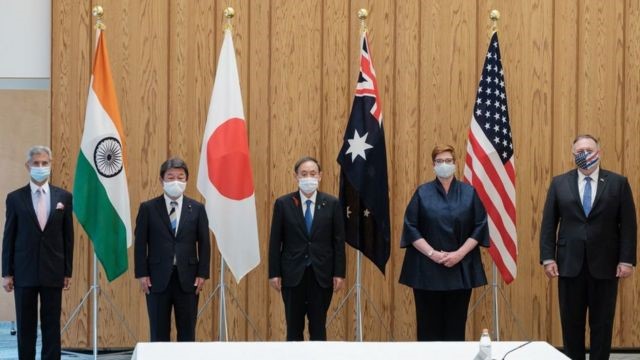Will China, India, Australia, Japan and the United States be able to reduce China’s influence?
On Tuesday, October 6, the Foreign Ministers of India, Australia, Japan and the United States are going to meet in Tokyo, on which China will have a keen eye.
India’s Foreign Minister Subramanian Jaishankar is on a visit to Japan to participate in this important meeting of the group ‘Quad’ of these four countries. They are also going to discuss bilateral matters with Japan there.
Talking about the economy, America is the world’s largest economy among the members of the Quad, Japan is the third economy and India is the fifth largest economy. Australia is also a developed country.
Such large collective power is gathering in Tokyo with the intention of reducing the increasing influence and dependence on China, the world’s second largest economy.
This meeting is different from the virtual meeting held last month in which trade and commerce ministers of India, Japan and Australia participated. The objective of this virtual meeting was to prepare a supply chain between the three countries to reduce economic and trade dependence on China.
This effort by India, Japan and Australia has been named the Supply Chain Resilience Initiative (SCRI), which aims to find ways to improve the supply chain in collaboration with other countries or blocks to reduce dependence on China.
These efforts can be seen as an alternative to the Belt and Road Initiative of Chinese President Xi Jinping. The Belt and Road Initiative is a strategy of the Chinese government to develop infrastructures and supply chains under which investment has been made in 70 countries and institutions. China started this work in 2013, in which billions of dollars have been spent so far.
Double edged sword against china
This double-edged sword, ie Quad and SCRI, will be used against China by increasing cooperation in the field of trade, health and security.
Dr Faisal Ahmad, an expert on Chinese affairs at the Four Schools of Management in Delhi, says, “India, Japan and Australia are trying to take this initiative and other countries, especially ASEAN countries, are trying to get involved in it.” “
But how much will India benefit from this?
According to Dr. Faisal Ahmed, India will benefit when it rejoins the Regional Comprehensive Economic Partnership (RCEP). But apart from Japan and Australia, China is also included in this group, which may cause difficulty to India.
He says, “Initiatives like SCRI can help Japan and Australia diversify their supply chains in ASEAN and East Asia, and at the same time benefit under the RCEP. But, SCRI may be profitable for India. Could not be proved because it is outside the RCEP. So in the post-pandemic world, India will get the benefit only when they join the RCEP again. “
Meeting agenda in Tokyo
The meeting in Tokyo is the second meeting of the quad countries. The first meeting was held in New York in September last year.
Regarding the agenda of the meeting, a spokesman of the Ministry of External Affairs of India said, “The agenda is largely to look at the new world order after Kovid-19 and the challenges posed in Asia by the epidemic. The issues of regional security will also be discussed.” Foreign ministers collectively will be expected to reaffirm the importance of an independent and open Indo-Pacific region. “
There is no denying the changing relationship between countries and new economic challenges due to the devastation caused by the epidemic. Prime Minister Narendra Modi, while addressing the United Nations recently, had predicted the emergence of a new world after the epidemic and emphasized India’s important role in it.
The Tokyo meeting will consider a path to enhance security in Asia (military cooperation), cooperation in health matters (vaccine delivery, etc.) and create supply chains (strengthening infrastructure). Its initiator was former Japanese Prime Minister Shinzo Abe, who has recently resigned from his post.
The importance of this meeting can be gauged from the fact that the US Secretary of State was going to visit some other countries as well, but due to poor health of President Trump, it has now been officially confirmed that the foreign Minister Pompeo will only participate in the quad meeting to be held in Tokyo.
Consensus about China’s opposition
Relations between these four countries have already been strong, but experts say that the alleged antics of China have now brought them closer to each other.
These four countries seem worried by the increasing impact of China. On the other hand, China has objected to the formation of this quad group. Last month, China’s deputy foreign minister, Luo Zhaohui, described the quad as an “anti-China frontline” or “mini-NATO”.
Professor Helena Lee is an expert on Chinese affairs in Sydney, Australia. “China is clearly worried that the Quad Group will take an anti-China shape in the future, threatening China’s interest,” he says.
But Professor Huang Unsong, associate dean of the School of International Studies of Sichuan University in China, says that it is not in anyone’s interest to oppose China of these four countries.
He says, “It is unfortunate that the Quad countries are hiding their failure in the fight against the Corona epidemic by fighting against China.”
In his view, the meeting is being held to “reinforce the notion of less dependence on China for greater security. In fact, international organizations such as the World Health Organization (WHHO) are looking at the episode in the exact opposite way.”
In Professor Huang Unsong’s view, “It is uncertain how effective it will be to strengthen the supply chain under the leadership of America.”
Despite the low hopes of success, it is the compulsion of these four countries to reduce the impact of China because these are the countries whose economies are deeply connected to China. Just pay attention to these facts.
– China was India’s largest trading partner from 2013 to 2017, now the second largest trading partner.
– Almost half (48.8 percent) of Australia’s total exports goes to China.
– Sino-Japanese bilateral trade was $ 317 billion in 2019, which is 20 percent of Japan’s total trade.
– Despite the US-China trade war, bilateral trade was worth $ 558 billion in 2019, which does not include services.
– As of July this year, bilateral trade between China and America was more than 290 billion dollars.
See also from this point of view, it will not be so easy for these countries to get rid of China and it may take years to achieve it. If we talk about the supply chain, then there can be many problems in it.
These four countries are also personally trying to reduce their dependence on China. India has banned many of China’s apps and the Modi government has spoken of self-sufficiency in May with the aim of reducing Chinese imports.
The US had started building a wall of tariffs against China from 2018 itself. Japan is working on a plan to bring back those companies whose production units are in China and Australia has also stopped coming under threat from China.
But the steps taken personally against China do not seem to be very successful so far. Despite America’s tariff war, China has sold $ 220 billion worth of goods to America till July this year. In this period, America has sold goods worth about $ 60 billion to China. Japan’s helplessness is that China is a big market for it.
There has not been much reduction in Chinese imports in India as well and experts say that after the end of tension on the border in Ladakh, both countries can come back once again in the same way as after the tension in Doklam in 2017. Had come
Professor Huang Unsong hopes that India can also show leniency regarding China.
Mutual differences
Apart from this, there is a difference of opinion between the quad countries on some matters. According to sources in the financial ministry, the relationship between India and Japan is close but differences on minor issues remain.
A ministry official said, “Japan wants to export chicken. In that too, they only want to send leg pieces because the Japanese don’t like leg pieces, they like breast pieces. We told them that you send us leg pieces so Want because he is of no use to you. “
Anyway, the finance ministry rejected this suggestion because it would destroy India’s poultry industry.
According to sources, Japan is in a hurry and is suggesting to start this initiative from November “But India will do what will be in its national interest”.
Professor Huang Unsong says that if the quad countries take any step against China, then China’s strategy will also change. China is also likely to take steps with less dependence on the Quad countries. “



